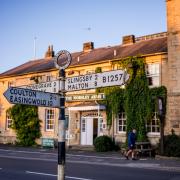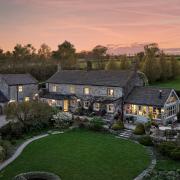Boredom – what’s that? Jo Haywood visits a North Yorkshire market town where there’s always lots to see and do

If one of your New Year’s resolutions is to live a more active life, you might want to consider moving to Skipton. Not only has the Yorkshire market town been named Britain’s happiest place to live by the Office for National Statistics, the happiest place to shop, according to the ShopAppy social enterprise scheme, and winner of the Best Small Outdoor Market 2017, but, as part of the wider Craven district, it’s also one of the most active places in England, according to the national Active Lives report from Sport England.
Almost three-quarters (72.5 per cent) of residents over the age of 16 exercise for 150 minutes a week, well above the 60.6 per cent average. And Skiptonians volunteer to support sport and exercise more than anywhere else in the country (apart from, bizarrely, the Isles of Scilly).
Skipton RFC is a typical case in point. Formed in 1874 just three years after the Rugby Football Union – making it one of the oldest rugby clubs in the world – the club is run almost entirely by volunteers.
There’s quite a crowd round the table at the impressive clubhouse at Sandylands when Yorkshire Life drops in for a cuppa and a catch-up. There’s Simon Smith the press officer, looking very smart in his Skipton RFC blazer, head groundsman Paul Jenkinson, assistant groundsman John Hughes and his wife Pauline, who come over from their home in Keighley to do their bit, committee member (and former player) Gordon Brown, club president Tom Hayes (on and off the phone trying to sign a new Kiwi player), working party stalwart Bob Fenn and Tracy Murray, who describes herself as ‘chief cook and bottle-washer’.
She is, in fact, the first team manager and has a 20-year connection to the club, going back to when her sons were players in the juniors. As well as organising the catering at every home game, Tracy is also senior fixture secretary, league liaison, referee liaison, 1st XV admin manager and social secretary. She even steps in behind the bar and mucks in with the cleaning when needs be.

‘I absolutely love it here,’ she said, as she chased her busy-bee grandson around the club function room. ‘It’s hard work and can be quite stressful if you let it, but there’s nothing like the buzz of signing a player or winning a game. I feel like I’m really part of something – something amazing.’
The club, currently in Yorkshire Three League (hovering mid-table last time we checked), enjoyed early success after being founded by the Liberal politician and landowner Sir Matthew Wilson, winning the coveted Yorkshire Cup three times between 1903 and 1912.
Its fortunes have fluctuated in the years since, but it still has one of the biggest mini and junior sections in Yorkshire, has club facilities that make visiting teams green with envy and has a thriving multi-generational following, from the littlest of littlies to the oldest of oldies.
‘We are very much a family club,’ said president Tom Hayes. ‘If you look through our records you see the same names appearing again and again – grandfathers, sons and grandsons all playing for their home team. It makes you feel proud to be part of something with such a long history. This club is very much at the heart of the community.’
But it isn’t just rugby that’s keeping Skipton fit and healthy. The town has been particularly proactive in promoting sport and exercise as part of the Tour de France legacy with cycling events like Le Petit Depart, Skipton Cycle Races, the Tour de Yorkshire and Skipton Triathlon.

‘Volunteers are the lifeblood of any sports club or event, and we’re blessed with a huge range of both,’ said Councillor Linda Brockbank, Craven District Council’s lead member for resilient communities (which is definitely a thing apparently). ‘You can participate in more than 60 different sports events across the calendar. The diversity is one of the things that makes this such a great place to live and work.’
Skipton’s wider, non-sporty appeal lies in its harmonious marriage of old-world charm, especially around the castle and canal quarters, and the hustle and bustle of a successful, expanding market town. It also boasts a very active cultural life.
Skipton Players, for example, have been staging shows since the 1930s, moving into the Skipton Little Theatre, a converted stable block in Clifford Street, in the 1960s. And Skipton Camerata, founded in 2004 by artistic director Ben Crick, is a professional orchestra based at the Town Hall, which has performed all around the country from Harewood House to London’s Globe Theatre.
One of the newer kids on the cultural block in Skipton Community Orchestra, which was set up in 2012 by friends Anita Birch (violin) and Catherine Davison (flute). The group – now 30 or so strong – meets twice a month to play anything from classical works to pop tunes to Disney favourites (they even tackled the Muppets on one memorable occasion). Most marvellously of all, everyone is welcome. It doesn’t matter if you can have been playing for sixty years or sixty days – there’s a music stand with your name on it.
‘We thought how great it would be to have a group where we could play informally and just have fun with music,’ said Anita. ‘There wasn’t anything like it at the time, so we started it ourselves.

‘We were amazed when about ten people turned up to the first rehearsal. We were slightly flute and clarinet heavy at first, but we’re much more balanced now.’
The youngest player is Anita’s 11-year-old daughter and the oldest is a trombonist in his 80s. It’s a real mixed ability group where the emphasis is on fun rather than formality, although the orchestra does perform a few public concerts during the year.
Conductor Jess Mahler (name/job symmetry alert) provides structure to the pay-as-you-play rehearsals, and ensures everyone is trundling along at the right speed and in the same direction during performances. Generally, however, it’s a democratic process with the musicians themselves calling the shots and choosing their own repertoire.
‘There are other opportunities for musicians in Skipton, but there’s nothing quite like our community orchestra’ said Anita. ‘The warmth and the fun and the team spirit – they all make it really uplifting.’
Well, cello there!
Members of Skipton Community Orchestra tell us why they decided to pick up their bows, wield their woodwinds and blast their brass.
‘For my 70th birthday, I decided to begin learning the cello and here I am two years later welcomed and encouraged with all my gaps and mistakes to join in with an orchestra,’ said cellist Peter Edwards. ‘I would never have believed that such an opportunity could be there.’
‘I joined on the recommendation of an existing member, who said it was a friendly, enthusiastic group of people with a lively conductor,’ said cellist Margaret Gray. ‘I like the choice of music; it’s varied and while I still breathe a sigh of relief when I see a classical piece in front of me, pop’s tricky syncopated rhythms are good for the soul.’
‘Being an older member,’ said clarinettist Joan Padgett, ‘it’s refreshing to mix with younger people, and it’s also great fun being part of an orchestra.’
‘I was new to the area after living in London for years and hoped the orchestra would be a good place to get to know people,’ said Laura Britchford, who plays the French horn. ‘It has been so much more than that. I think because it was set up by people who just wanted to play and enjoy music, the atmosphere is the equivalent of a warm hug.’
‘As someone who only took up the cello six years ago at the age of 58, it is wonderful to be able to play in an orchestra that welcomes players of all ages and abilities,’ said cellist Sue Yule. ‘I always go home feeling uplifted by the experience of playing with such a friendly group of people who love making music together.’



























